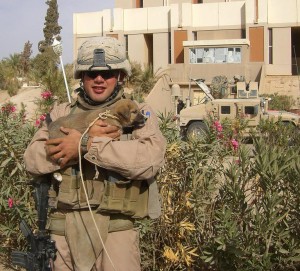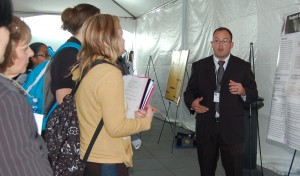At 18, Christian Somoza didn’t know what he wanted to do with his life. He was enrolled in Cerritos College but was struggling a bit. After a semester he decided he wasn’t ready for college, and joined the Marine Corps, where he could develop discipline, serve his country, and earn a G.I. Bill, which covers a range of veteran benefit programs, including college tuition assistance.

After four years in the Marine Corps, leaving at the rank of sergeant, Somoza returned to Cerritos College ready to focus on his education. While there, he took an introductory psychology course, during which he learned more about post-traumatic stress disorders (PTSDs). It piqued his interest.
“[In the service] they tell you about the outcomes, but they really don’t tell you why it happens, what pre-[disposes] you to it. They don’t tell you why people come out different,” said Somoza, 26, who was deployed to Iraq twice between 2006 and 2008.
Somoza decided he wanted to become a psychologist and help veterans. He wanted to find a better way to prepare veterans for their re-entry to civilian life as well as help them with their personal relationships. At 80 to 90 percent, the military has one of the highest divorce rates in the country, he said. Service personnel, who marry young, are often separated for seven months to a year from their spouse, and a lot goes missing in those relationships. He said many Marines aren’t able to cope very well with long-distance breakups that happen while they are so far away from home.
Finding the right university where he could conduct research on this topic was Somoza’s next mission. It turned out to be an easy one.
A student from CSU Dominguez Hills visited Cerritos College to discuss the university and, among other things, the psychology department and its focus on research and helping to prepare students for graduate programs. This was just what Somoza had in mind.
He transferred to CSU Dominguez Hills in the fall of 2010. “I found the psychology department is very strong in research,” he said.
He took a class in statistics taught by Carl Sneed, associate professor of psychology and recipient of the 2012 Excellence in Research, Scholarship and Creative Activity Award. Sneed’s research work with adolescents in the area of mitigating risk behaviors interested Somoza.
During Somoza’s first semester at the university, he started volunteering as a research assistant in Sneed’s adolescent health research laboratory, which eventually led to a paid position. Somoza developed quantitative and qualitative research skills such as statistical analyses and interview techniques.
“It’s been one of the most dramatic transitions in my life, aside from combat,” said the graduating senior. “I’ve learned so much. Not only classwork, but being able to take course work and apply it to research. It’s not just small projects we do for class, but it’s actual research that will affect people over a long period of time.”
Currently, Somoza is working on a project developing interventions for parent-child communication, in collaboration with Sneed through a grant from the Centers for Disease Control and Prevention (CDC).

“You don’t get these opportunities that often. Here [at CSU Dominguez Hills] there are these opportunities for students if they are willing to take them,” said Somoza, a 2010-11 McNair Scholar, who also presented “Facebook Use Associations with Personality Disorders” at the 2012 CSU Dominguez Hills Student Research Day in February. “It’s an undiscovered gem. The psychology department here is amazing when it comes to research and helping students find what they want to do and how to accomplish it.”
In thinking about graduate school, Somoza took advice from his professors at CSU Dominguez Hills, who stressed to him and other students the need to not only focus their undergraduate research on what they want to do in graduate school, but also to identify and contact professors for whom they can see themselves working. He knew he wanted to go to University of Colorado, Denver, so before applying, he began an email correspondence and made a trip to the campus to meet the professor who will be his graduate adviser and research leader starting in the fall.
Somoza has been accepted to CU Denver in the clinical health psychology doctoral program to conduct research on the effects that relationship issues among active duty military personnel have on PTSD. He wants to find out what qualities the 5 to 10 percent of service personnel with successful relationships have, so he can help the overwhelming majority who suffer from failed relationships.
“It’s definitely not in the literature,” said Somoza of scholarly scientific research on the subject. “There’s not much at all when it comes to the military.”
He explained, another factor is that the military places value on toughness and rather than introspective examination.
“The Marine Corps is a very hardy branch. Our focus was on combat. You develop a mentality of going to war,” said Somoza.” It’s great for war because you need it to survive, but it’s not great for being at home.
But, Somoza said there are benefits that can be used at home and school. The military helped him develop discipline, and has taught him how to adapt to changes and set priorities, which he has applied to his studies. With a sense of perspective, he said, “I always think back, would I rather be in this air-conditioned classroom or in that Humvee that’s 140 degrees inside.”
After finishing his doctoral program, Somoza plans on a career focused on veteran mental health, whether in private practice or within an organization such as a U.S. Department Veterans Affairs mental health care center.
“I think my graduate experience will direct me toward something I’d really like to do,” said Somoza.